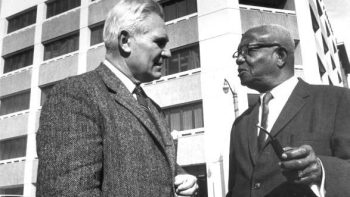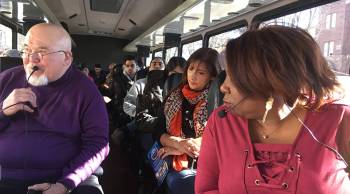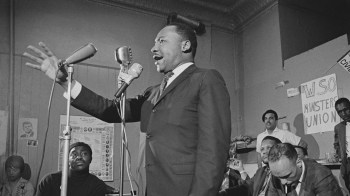African-Americans hit hard by housing crisis
TEXT OF STORY
BOB MOON: As the nation honors Martin Luther King Jr. with celebrations, forums and speeches, we’re taking a look at one aspect of African-American economic well-being: home ownership. A lot more black families were able to get into starter homes in the last decade as subprime lending helped push African-American home ownership to record highs.
But now, foreclosures are rampant,and African-Americans are losing ground fast.
Marketplace’s Mitchell Hartman explains.
MITCHELL HARTMAN: Martin Luther King Jr. grew up in a house in Atlanta that his grandfather bought in 1909 for $3,500. Civil rights groups have long pushed home ownership as a path to greater economic independence. By the mid-2000s, a combination of government affordable-lending programs and risky subprime mortgages had boosted African-American home ownership to an all-time high — just under 50 percent. But since then, it’s fallen hard.
MARC MORIAL: There’s no question it’s been catastrophic.
Marc Morial is president of the National Urban League and I reached him on his way to an MLK Day forum in New York.
MORIAL: We’ve lost as much ground in the last three to four years as we had gained in the previous 20 to 25 years. That’s how stark it is for black America.
African-American home ownership has fallen more than 3 percent — twice as much as the population at large, and also more than Hispanics and Asians.
SUSAN WACHTER: African-Americans have been subject to more subprime lending and targeting.
Economist Susan Wachter at the Wharton School says a lot of those loans were inappropriate or fraudulent. Add to that high unemployment among African-Americans, and the result is a soaring foreclosure rate.
In Ohio, for instance, more than 1 in 10 may ultimately lose their homes. Jeri Mason lives in Euclid, Ohio, and she’s seen lots of bank seizures in her neighborhood. She narrowly avoided foreclosure herself by getting a mortgage repayment plan.
JERI MASON: I say, the best thing I ever got in my life was pulling into my driveway for that first time. I mean, I still think it’s an awesome thing to be able to do to own a home. But the financial meltdown and the mortgage crisis and the credit crisis we’ve had here in this country — a lot of people aren’t going to have that feeling.
Groups like the National Urban League are hoping more African-Americans can again walk into homes they own. They’re pushing “urban homesteading” initiatives to get working families into foreclosed properties that they can renovate.
I’m Mitchell Hartman for Marketplace.
There’s a lot happening in the world. Through it all, Marketplace is here for you.
You rely on Marketplace to break down the world’s events and tell you how it affects you in a fact-based, approachable way. We rely on your financial support to keep making that possible.
Your donation today powers the independent journalism that you rely on. For just $5/month, you can help sustain Marketplace so we can keep reporting on the things that matter to you.


















